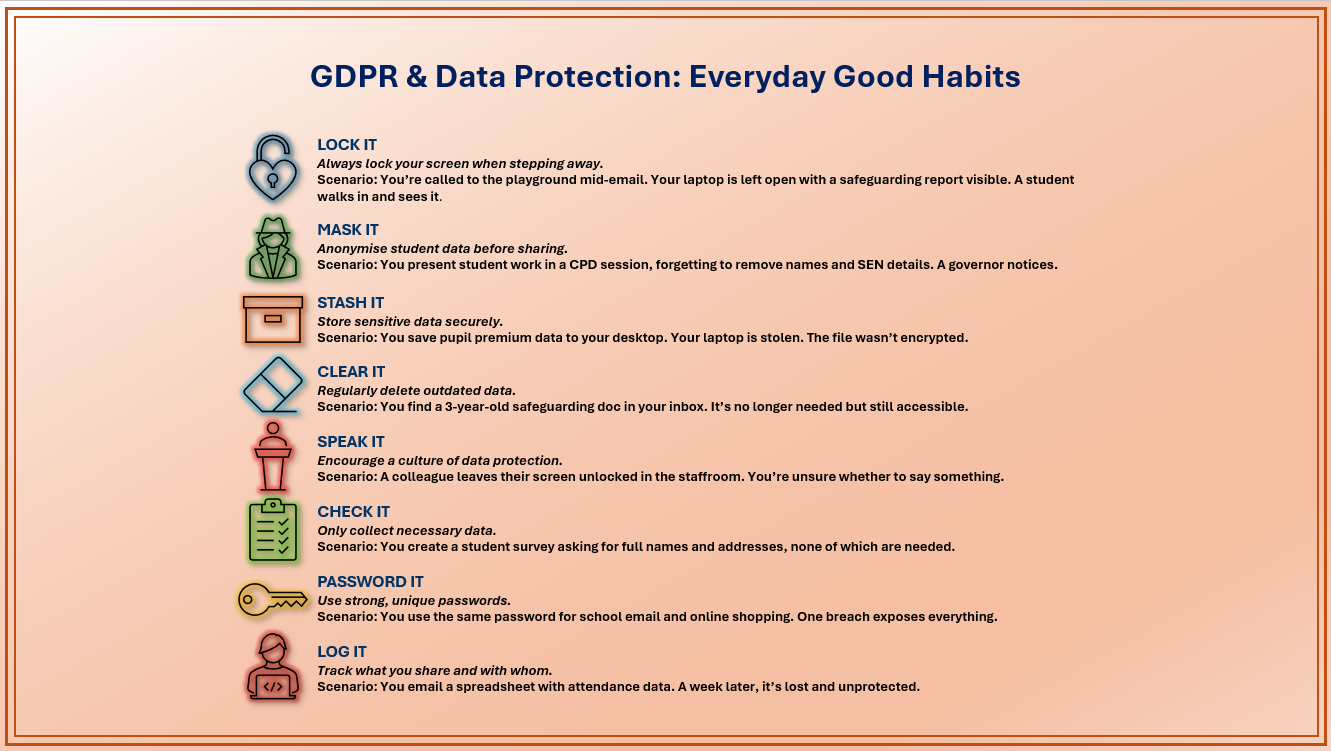Let’s be honest: when most of you became educators, you dreamed of inspiring minds, not mastering the fine print of data protection law. But here you are, in a post-GDPR, post-DUAA world, where understanding the “lawful basis for processing” is as crucial as remembering to take the register.
The good news? While the Data (Use and Access) Act 2025 (DUAA) has introduced a few tweaks, the core principles remain intact (just sharpened), especially for education settings. Once you get past the legalese, the lawful bases for processing personal data are more intuitive than they seem and, dare I say, even a little philosophical.
Let’s take a look.
The “Why” Before the “How”
Before you collect, use, or store any personal data, from student attendance to parent emails, even the staff lunch allergy list, you must know why you’re doing it. And that “why” must align with one of six lawful bases set out by the UK GDPR.
Think of it like this: every piece of personal data is a guest at a party. You need a legitimate reason for inviting them in, or you risk violating privacy laws (and no one wants to be that school on the front page for a data breach).
Now let’s meet our six lawful gatecrashers, refreshed for 2025.
- Public Task: The Educator’s Bread and Butter
If your school or university is a public authority, public task remains your primary basis. You’re carrying out functions in the public interest; teaching, safeguarding, administering exams. The new DUAA reinforces this by clarifying that digital education tools and platforms used to fulfil statutory functions also fall under this basis.
Example: Recording attendance or using a digital behaviour management system. You’re not doing it for fun (although some platforms are slick), but because it’s integral to your duties.
Bonus: You still don’t need consent. In fact, the DUAA discourages unnecessary consent requests where a clearer basis applies, to avoid undermining trust or creating confusion.
- Consent: Still Not Always the Golden Ticket
Everyone loves a good consent form. Until they realise it’s not always the right tool. Under GDPR, consent must be freely given, informed, and withdrawable. Adding to that, under the DUAA, there’s increased emphasis on ensuring consent is genuinely voluntary, particularly when dealing with minors or those in a dependency relationship. That can be tricky in a school setting where there’s a clear power imbalance.
When it works: Using student photos on your school website or social media. This is optional, celebratory, and low risk. The classic consent use case.
When it doesn’t: Collecting data for the school lunch system or learning platforms required by the curriculum. The DUAA 2025 warns against “coerced consent” in core service delivery, especially in education.
- Legal Obligation: Because the Law Says So
This one’s straightforward. If another law requires you to process data, GDPR says “go ahead.” However, there is now more focus on clarity and specificity.
Example: Disclosing safeguarding concerns to the local authority or providing payroll data to HMRC. No need to ask nicely; the law’s already spoken.
But be careful. Vague references to “policy” aren’t enough. Be ready to cite specific laws (e.g. Education Act 1996, Children Act 1989, Safeguarding Vulnerable Groups Act 2006). The DUAA encourages clearer audit trails for these decisions.
- Contract: Mind the Fine Print
More relevant to universities and colleges, this applies when data processing is necessary for a contract (e.g., enrolment, accommodation).
Example: : A university processing student accommodation requests or managing course enrolment. The student signed up for a degree; you need to process data to deliver on your end of the bargain.
It can also apply to employment contracts.
DUAA update: The Act highlights the growing use of AI and third-party tools in education, requiring contracts with digital vendors to include clear data use terms. Processing data under contract must be strictly necessary, not just convenient.
- Legitimate Interests: The Wild Card, with Stricter Controls
This basis has always been the most flexible and misunderstood. The DUAA has added extra scrutiny for public authorities like schools when using it.
Example: Using CCTV at an independent school for safety. Your interest (keeping people safe) outweighs the slight intrusion on privacy, as long as it’s well-signposted and proportionate.
But if you’re a public authority, use this one sparingly. The ICO tends to raise an eyebrow when schools over-rely on it.
New under DUAA: Public bodies must not use this basis for tasks where another basis (e.g., public task) is more appropriate. The DUAA also introduces a “Legitimate Interests Assessment (LIA) log” for higher risk uses. A lightweight but structured way to show you’ve considered the risks and mitigations.
- Vital Interests: Still for Emergencies Only
This is your break-glass-in-case-of-emergency option. Life-and-death situations only. It’s rarely used, but crucial when needed.
Example: A student collapses, and you need to share medical information with paramedics. GDPR isn’t going to stand in your way.
If you’re using this basis often, your emergency planning may be lacking. The DUAA nudges organisations toward more proactive safeguarding policies rather than relying on this exception.
So… How Do You Choose the Right One?
Here’s the secret: don’t overthink it. Start by asking yourself:
- Why are we collecting this data?
- Is it part of our statutory duties?
- Is there a specific law that applies?
- Would the individual expect this use?
- Can we achieve the goal without processing personal data?
Once you’ve chosen your lawful basis, stick to it. You can’t switch to “consent” just because someone complains. And yes, you must inform individuals which basis you’re using in your privacy notice and be prepared to justify it. Trust me, having this straight makes life easier when the ICO, or a curious parent, comes knocking, especially when using automated systems or AI-assisted platforms.
Lawful basis isn’t just a box-ticking exercise. It’s a lens through which we examine how and why we handle people’s information. The DUAA may have added a few sharper edges and new expectations, but the heart of data protection remains the same: respect. Whether you’re an early years teacher or a university data officer, understanding this stuff isn’t just compliance.
It’s care.











